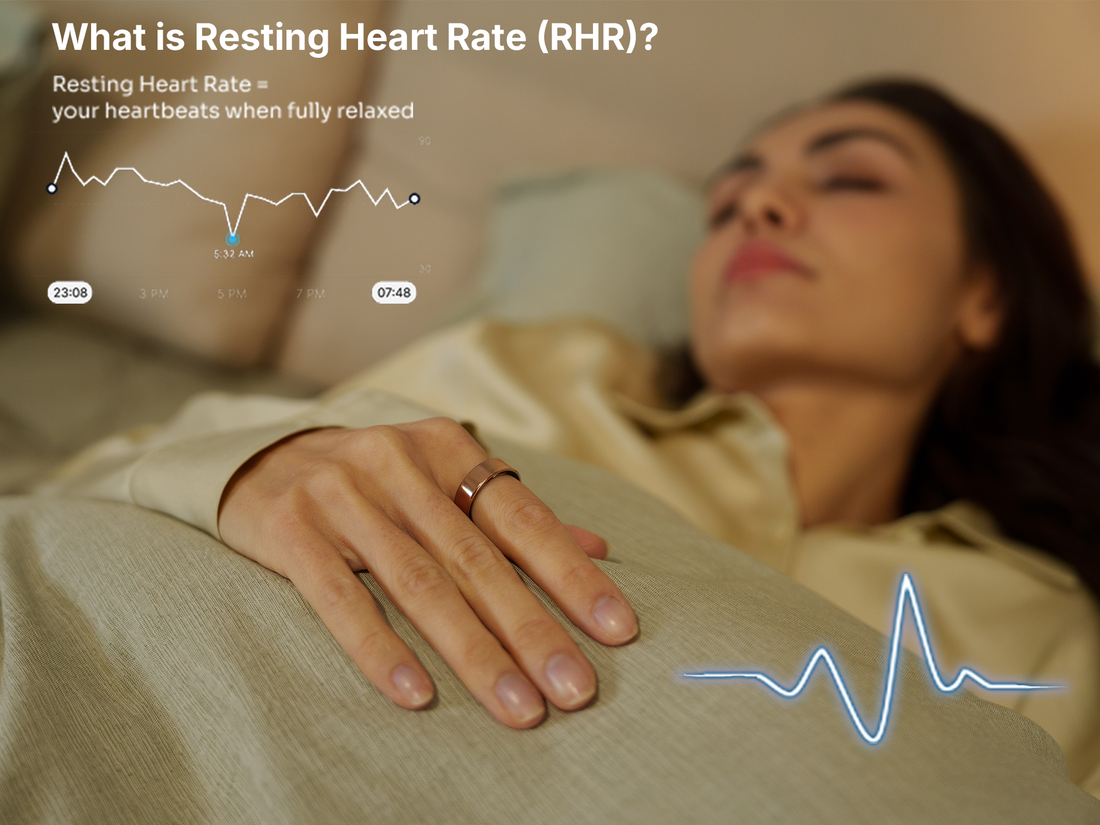
Your Heart's Whisper: A Guide to Understanding Your Resting Heart Rate (RHR)
We’ve all felt it. The frantic pounding in your chest after rushing up a flight of stairs, or the steady, quiet rhythm you notice when you’re finally relaxing on the couch. Your heart rate is a vital, living signal, constantly adapting to your life. But what can it tell you when you’re not moving at all?
This is the power of your Resting Heart Rate (RHR)—one of the most fundamental and insightful metrics for understanding your long-term health, fitness, and daily recovery.
Tracked by your Omni Health Ring, your RHR is more than just a number; it’s a whisper from your body. Learning to interpret this signal is key to understanding your cardiovascular efficiency, managing stress, and gauging your recovery. It’s a foundational piece of the puzzle that allows you to truly "Own your EnerQi™."
What is Resting Heart Rate (RHR)?
Simply put, your Resting Heart Rate is the number of times your heart beats per minute (bpm) when you are at complete rest. It's a direct reflection of your cardiovascular efficiency.
Think of your heart as a high-performance engine. A more efficient engine Actionable Ways to LowerYour Resting Heart Ratecan produce the same amount of power at a lower RPM (revolutions per minute). Similarly, a stronger, healthier heart can pump the same amount of blood with fewer beats. This is why a lower RHR is generally considered a hallmark of good cardiovascular fitness.
Why Your Truest RHR is Measured During Sleep
To get a true RHR reading, your body must be completely at rest—free from the influence of food, caffeine, exercise, and daily stress. This makes your sleeping hours the perfect time for measurement.
Your Omni Health Ring analyzes your heart rate during sleep to find its lowest point, providing you with your most accurate and consistent RHR. This overnight reading serves as a stable and reliable indicator of your body's baseline state, offering a clear window into your recovery and overall health.
It's All Relative: The Power of Your Personal Baseline
Like many health metrics, there is no single "perfect" RHR. A healthy RHR can vary widely based on factors like age, gender, medication, and especially your fitness level. An elite athlete might have an RHR in the 40s, while for another healthy adult, the 60s might be their norm.
That’s why your Omni Health Ring focuses on establishing your personal 30-day baseline. By tracking your trends over two weeks, we learn your normal. This allows us to move beyond generic advice and alert you to changes that are meaningful and specific to your body.
Decoding the Signals: What Your RHR is Telling You
While a long-term decrease in RHR is a great sign of improving fitness, it’s the short-term increases above your baseline that often carry the most important messages about your daily health. Your Omni Health AI analyzes these changes, often in combination with other vitals, to provide you with actionable insights.
Here’s what your body might be telling you when your RHR is elevated:
-
Immune System Under Pressure (Moderate Risk): Have you noticed your RHR is a bit higher than usual, your HRV is lower, and your temperature is slightly up? This combination is a classic sign that your body is fighting something off, whether it's the beginning of a cold or the result of overtraining.
-
Action: This is your body asking you to ease up. Consider reducing your training intensity, prioritize sleep, hydrate well, and keep an eye on your symptoms.
-
Body Imbalance (High Risk): A sharp spike in RHR (e.g., more than 8-10 bpm above your baseline) combined with a significant drop in HRV and a rising temperature is a strong red flag. ()This indicates your body is under significant stress, likely from an acute infection (like the flu, which often comes with a fever) or severe overexertion.
-
Action: Your top priority is rest. If you're feeling unwell, monitor your symptoms closely and don’t hesitate to seek medical advice.
-
Chronic Strain Accumulating: Is your RHR slowly but consistently creeping up over several days or weeks, perhaps along with a decline in sleep quality? This can be a sign of accumulating fatigue from prolonged work stress, insufficient recovery between workouts, or other life pressures.
-
Action: This is a signal to proactively schedule downtime. Prioritize a rest day, schedule a relaxing activity like meditation or yoga, and focus on getting restorative sleep.
-
The Rebound: A Sign of Recovery: Seeing your RHR return to its baseline after a period of being elevated is a positive Recovery Signal. It confirms that your body has successfully navigated a challenge—be it an illness or a tough training block—and is on the mend.
How RHR Influences Your EnerQi™ Score
Your RHR is a direct contributor to your body’s overall energy economy and, therefore, a key input for your daily EnerQi™ Score.
A low and stable RHR means your heart is working efficiently, conserving precious energy for other tasks like cognitive function, physical performance, and immune defense. When your overnight RHR is at or below your baseline, it tells us your body achieved a state of deep recovery. This positive signal contributes to a higher starting EnerQi™ Score, reflecting a system that is rested, efficient, and ready for the day ahead.
Actionable Ways to Lower Your Resting Heart Rate
Improving your RHR is a marathon, not a sprint. It’s the result of consistent, healthy habits that strengthen your heart over time.
-
Get Moving: Regular aerobic exercise (like brisk walking, running, cycling, or swimming) is the most effective way to strengthen your heart muscle.
-
Manage Stress: Chronic stress keeps your RHR elevated. Incorporate stress-management techniques like mindfulness, deep breathing, or yoga into your routine.
-
Prioritize Sleep: Quality sleep is critical for recovery and helps lower your heart rate. Aim for consistency in your sleep schedule.
-
Stay Hydrated: Dehydration can cause your heart to beat faster. Make sure you're drinking enough water throughout the day.
-
Limit Stimulants and Alcohol: Caffeine and nicotine can temporarily raise your RHR, while alcohol can disrupt sleep and lead to a higher overnight RHR.
By paying attention to your heart's whisper, you gain a trusted ally in your health journey. Your RHR provides clear, simple, and powerful feedback on your fitness and recovery. It’s another way Omni Health helps you translate your body’s signals into a strategic advantage for your life.
